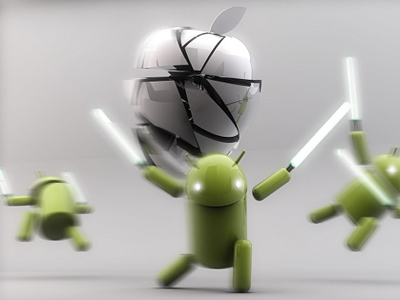Google Baffled by Apple Suing Android Partners
Former Google CEO and current executive chairman Eric Schmidt has questioned why Apple focuses on suing the search engine giant's partners instead of directly suing its competitor instead.
Referring to the "on and off" relationship between Apple and Google during the last year, Schmidt said the former's decision to remove Google's map app in iOS 6 was surprising, which wasn't one of the firm's best move.
Obviously, we would have preferred them to use our maps. They threw YouTube off the home screen [of iPhones and iPads]. I'm not quite sure why they did that. The press would like to write the sort of teenage model of competition, which is, 'I have a gun, you have a gun, who shoots first?'The adult way to run a business is to run it more like a country. They have disputes, yet they've actually been able to have huge trade with each other. They're not sending bombs at each other. I think both Tim [Cook, Apple's CEO] and Larry [Page, Google's CEO], the sort of successors to Steve [Jobs] and me if you will, have an understanding of this state model. When they and their teams meet, they have just a long list of things to talk about.
When asked whether Apple and Google are currently discussing a patent-related settlement, Schmidt avoided a direct response, but did hint at the fact that the rivals could be in talks.
"Apple and Google are well aware of the legal strategies of each other," he stated. "Part of the conversations that are going on all the time is to talk about them. It's extremely curious that Apple has chosen to sue Google's partners and not Google itself."
Apple has spent hundreds of millions in court fees and losses in suing Google partners such as Samsung and Motorola. Further alluding to Apple's patent habits, Google stressed that companies in general are the main victims.
"Google is doing fine. Apple is doing fine. Let me tell you the loser here. There's a young Andy Rubin trying to form a new version of Danger [the smartphone company Mr. Rubin co-founded before Android]. How is he or she going to be able to get the patent coverage necessary to offer version one of their product? That's the real consequence of this."
Get Tom's Hardware's best news and in-depth reviews, straight to your inbox.
Last year, for the first time in the two firm's history, spending by both Apple and Google on patents exceeded their spending on research and development of new products.

Zak Islam is a freelance writer focusing on security, networking, and general computing. His work also appears at Digital Trends and Tom's Guide.
-
freggo This is all driven by litigation happy attorneys.Reply
We need a hunting season for lawyers :-)
-
freggoThis is all driven by litigation happy attorneys.We need a hunting season for lawyers :-)BigMack70The explosion of patent trolling is one of the worst things to happen to the tech industry in a long time...Reply
You guys are right...that's why I just stay home and do the robot:
http://www.youtube.com/watch?v=E-_iUHY8RBs
Thanks Dancin Kim lolz! -
ddpruitt Replyspending by both Apple and Google on patents exceeded their spending on research and development of new products.
Leave it to Zak to spin the purchase of Motorola as spending on patents. -
Branden QUOTE: "Google is doing fine. Apple is doing fine. Let me tell you the loser here. There's a young Andy Rubin trying to form a new version of Danger . How is he or she going to be able to get the patent coverage necessary to offer version one of their product? That's the real consequence of this."Reply
and that's exactly why apple is doing this, it's easier to prevent competition from sprouting up in the first place than it is to legitimately beat it on a level playing field. it's a dirty tactic, but it's the only way to stay on top if you're not willing to innovate. -
guru_urug Everyone in the tech world knows whats going on. There have been excessive and ridiculous patent lawsuits in the last few years. Everyone knows that there is better use for the money and energy spent on this. Still lets not talk about the elephant in the room! More innovation less poop-flinging please, consumers are losing out. Just sort it out like grown-ups, Win-Win-Win!!Reply -
ericburnby Is he talking about when Andy Rubin worked at Apple (1989-1992)? The time where Andy was a junior engineer working under two senior engineers who were developing a key patent that's at the heart of both iOS and Android? A patent that was being developed at the exact same time Andy was "on the same team"? A patent that Apple now claims Android infringes?Reply -
esrever My guess is the top executives of apple is going to cash out with as much money as possible.Reply -
wildkitten ddpruittLeave it to Zak to spin the purchase of Motorola as spending on patents.How is that spin? It has always been widely believed by many that Google's main purpose in purchasing Motorola's mobility division was to get ownership of their patents.Reply
From Forbes...
http://www.forbes.com/sites/quentinhardy/2011/08/15/google-buys-motorola-for-patent-parts/
(Google CEO Larry) Page said in the blog post announcing the deal, “Our acquisition of Motorola will increase competition by strengthening Google’s patent portfolio, which will enable us to better protect Android from anti-competitive threats from Microsoft, Apple and other companies.”
-
the1kingbob The biggest problem with patents is the ability to patent processes or designs that are considered to be a standards by the public. This was seen with Henry Ford. He also didn't start Ford because the patent on the "automobile" was locked. If anyone wanted to sell a car, they had to be approved by the patent holder which included a fee. Same thing is seen today, rather hard for a start up to make a phone with wifi without being sued by someone.Reply -
internetlad Reply"Google is doing fine. Apple is doing fine. Let me tell you the loser here. There's a young Andy Rubin trying to form a new version of Danger . How is he or she going to be able to get the patent coverage necessary to offer version one of their product? That's the real consequence of this."
What a down to earth sentiment.
